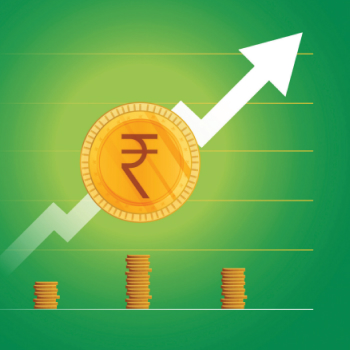Be Prepared for Turbulence at Stock Exchanges

Election 2024 results have turned every poll pundit’s calculation awry and the stock market was not an exception. The Indian stock market experienced its most significant decline in the past four years, with the Sensex plummeting
The India VIX surged by 31 per cent, reaching a peak of 31.71 before settling at 26.75, indicating heightened volatility following the election results. The benchmark indices sharply declined on 04 June, the day of counting of votes as Sensex was down by 4390 points, however only to become bullish the next very day.
The day marked heavy sell orders by large foreign institutional investors (FII) mounting the largest ever short-selling bet in the Indian markets, leading to a massive 6000 points fall in the Sensex and nearly 1500 points fall in Nifty index.
Taking a cue from the sudden spike at the stock exchange, the former Congress president, Rahul Gandhi termed it the ‘biggest stock market scam’. He went to the extent of questioning why top BJP leaders, including Prime Minister Narendra Modi, gave investment advice to people just days before election results were to be announced. Moreover, Gandhi has sought a Joint Parliamentary Committee (JPC) investigation into the episode.
Besides, Rahul Gandhi questioned why top BJP leaders, including Prime Minister Narendra Modi, Union Home Minister Amit Shah and Finance Minister Nirmala Sitharaman, made comments about the stock market just days before the announcement of election results. “PM Modi said that the stock market is rising at a great speed. The Union Home Minister said that on 4 June the stock market will be on the rise, and you should all invest. A similar claim was made by the Finance Minister. Amit Shah says buy shares before 4 June. On 19 May, PM Modi says the stock market will break records on 4 June”, he pointed out.

Rahul Gandhi’s allegations came days after equity investors suffered a massive loss of `31 lakh crore as markets went into a tailspin with the BSE Sensex tumbling nearly 6 per cent as vote counting trends showed BJP lagging behind to have a clear-cut majority in Parliament on its own.
Replying to Gandhi’s allegation, BJP leader Piyush Goyal said that Rahul Gandhi has made frivolous allegations against BJP leaders. Goyal was quick to add that Market cap of PSUs listed has increased 4 times under the Modi Govt. “In the last 10 years of Modi Govt, for the first time our market cap has crossed over 5 trillion dollars,” he said.
This dramatic fall and subsequent volatility underscore the importance of spreading investments across various assets to mitigate risk and enhance potential returns. Whether navigating these volatile markets or planning for steady growth, diversification remains a crucial necessity for maintaining portfolio stability.
The results of the recently concluded general elections differed significantly from the opinion and exit polls forecasts. Following the India General Elections 2024, the stock market experienced significant volatility. Initially, after the exit poll numbers suggested that the BJP would comfortably win with a strong majority, the markets reacted positively, showing a sharp uptick in anticipation of political stability.
There is yet another twist to the story. SEBI had hurriedly appointed a Gandhi family close aide and former RBI deputy governor, Usha Thorat, to head key panel of the stock exchange watchdog, Committee on Settlement Guarantee Fund of Stock Exchanges, on the day of recently concluded Lok Sabha election results, has raised eyebrows of India Inc. The stock markets seem to be highly intrigued by the appointment even before the results were out on the very day.
For starters, Usha Thorat is the wife of Yashwant Thorat, who after retiring as the Chairman of NABARD in November 2007, was made the CEO of Rajiv Gandhi Foundation, a private trust of the Gandhi family with chairperson Sonia Gandhi, board members Rahul Gandhi, Priyanka Gandhi and P Chidambaram.
India’s equities took a bit of a hit earlier this week, after early election results revealed that the incumbent BJP party was on track to lose the majority in the lower house of Parliament, held since 2014.
That partly reflected an unwind of the earlier sharp rise, after exit polls had painted a more optimistic picture for the BJP, and over the rest of this week so far they’ve since essentially entirely recovered. But there’s no denying that the new electoral situation is a more challenging one for the incumbents. While it doesn’t totally hamstring the reform agenda that investors have been banking on, it may make the contentious parts of it, such as labour market liberalisation, less likely.
There is yet another twist to the story— denizens of India’s corporate world have maintained their stony silence this time on India’s election outcome. But be it Uday Kotak, Anand Mahindra, Sunil Mittal, Mukesh Ambani, Kumar Birla or Harsh Goenka and even well-known faces and fund managers who are part of PM’s Economic Advisory Council, are all just silent and have not congratulated Narendra Modi for NDA’s majority in the poll. In fact, the corporate honchos’ silence speaks volumes about their apprehension about the stability of the new coalition government.
"This dramatic fall and subsequent volatility underscore the importance of spreading investments across various assets to mitigate risk and enhance potential returns"
Prashanth Tapse, Senior VP (Research), Mehta Equities, says that given the known factors, it’s advisable to allow some time for the markets to stabilise following the unexpected election outcome. Traders and investors should be cautious and consider focusing on defensive and non-government-driven sectors such as FMCG, Telecom and Pharma stocks. The upcoming budget and quarterly earnings reports will be crucial events that could influence market movements.
FIIs are likely to reconsider their positions, and DII money will be tested in the short term, which is a cause for concern. The spike in the stock market suggests that traders and investors should prepare for ongoing turbulence.

Advising traders and investors how to behave in such turbulent market, Shiv Parekh, Founder and CEO, hBits, says, “When building a diversified portfolio, it’s crucial to have multiple investments that are not correlated to increase potential return sources and yield long-term results.”
This dramatic fall and subsequent volatility underscore the importance of spreading investments across various assets to mitigate risk and enhance potential returns. Whether navigating these volatile markets or planning for steady growth, diversification remains a crucial necessity for maintaining portfolio stability.
There have been instances where black swan events such as the Covid-19 pandemic have had a significant impact on the financial markets, underscoring the importance of a diversified portfolio during such times of uncertainties.
Diversification of portfolio is more important for long-term financial goals. Also, alternative investments add to increased stability and security. One such asset class is fractional ownership of real estate, which allows co-own portions of high-value commercial real estate and provides access to Grade A properties or location which would have been beyond the reach of an individual investor. While capital markets as well as other traditional asset classes are influenced by a multitude of national and global economic factors, real estate is influenced by local factors such as location, property condition and demand-supply dynamics.